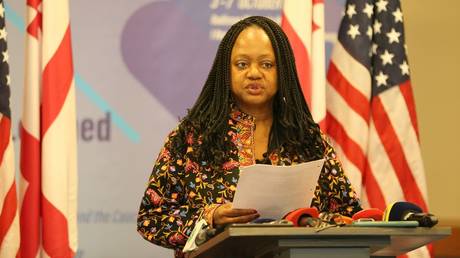
The AUKUS deal does not create any new nuclear states, a senior US diplomat has said
The technology-sharing agreement between the US, the UK, and Australia, which will provide the latter with nuclear-propelled submarines, does not pose any threat of a regional arms race, a senior US official has claimed.
Bonnie Jenkins, the Under Secretary of State for Arms Control and International Security, attempted to dispel concerns about the trilateral AUKUS scheme voiced by some Pacific nations during a briefing on Tuesday. The question about a possible arms race came from a Cambodian journalist, who said his nation, a close ally of China, was not happy about possible destabilization in the region.
Jenkins responded that Washington wanted to assure other nations that the pact, sealed in 2021, was not meant “to create any kind of arms races.”
“Australia is not going to become a nuclear weapons state and they’re not going to be able to use the nuclear-powered submarines to develop a nuclear weapon either, because if they tried to do that, the whole submarine would not work anymore,” she explained.
Concerns about the AUKUS deal expressed by other nations have not been limited to whether Australia could use the technologies to create nuclear weapons.
Critics of the deal, including Russia, have suggested it is a way for the US to project additional military power in the Pacific.
Last week, Russian Foreign Minister Sergey Lavrov said Moscow is “deeply concerned” that the AUKUS arrangement is increasingly acquiring “the traits of a military bloc.”
He accused Western nations of brinkmanship which has led to the world “balancing at the edge of a direct clash between nuclear states,” in a reference to the Ukraine conflict.
READ MORE: Pacific nation reacts to Biden’s cannibalism quip
Beijing also reiterated its own objections on Monday, with Foreign Ministry spokesman Wang Wenbin saying that through AUKUS, Washington will violate the “purposes of the South Pacific Nuclear Free Zone Treaty and create severe risks of nuclear proliferation.”
Foreign Minister Wang Yi made a similar claim last week during a visit to Papua New Guinea, saying the region “should not be a playground for major powers.”




